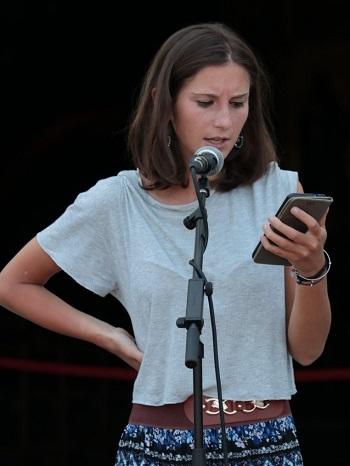Elisa Citano M.A.

Ancient Philosophy and History of Ancient Science (APhil/HistAS)
Geschichte der Philosophie
Institut für Klassische Philologie
Unter den Linden 6
10099 Berlin
2019
Speaker at ‘Seminario Itinerante di Storia della Filosofia Antica: Aristotele, Fisica VIII’ at the University of L’Aquila and at the University of Bergamo
2018/2019
Master’s Degree in Ancient Philology, Literature and History at the University of Florence with a dissertation in History of Ancient Philosophy entitled ‘Aristotle on void: an analysis of Physics IV 6–9’
2018
Speaker at ‘Storia della Filosofia e Scienza: una giornata di studi presso l’Università degli Studi di Milano - Dipartimento di Filosofia’
2017
Erasmus + at the University of Oslo
2015/2016
BA Degree in Language and Literature Studies at the University of Florence with a dissertation in History of Ancient Philosophy entitled ‘The quantity in Aristotle, Categories 6’
2016
Internship at Accademia della Crusca
2008 – 2013
High School classical qualification at Liceo Classico Galileo, Florence
Work history
09/2024 – current
Teacher
Middle School I.C. GRUGLIASCO - 66 MARTIRI
High School I.I.S. CURIE LEVI – Turin
Conferences and Talks
11/21
Biennial Classics Graduate Student Conference, Horror vacui: Fear of Space in the Ancient World, New York University, Department of Classics, “Traces of Horror Vacui in Ancient Greek Philosophy”
09/21
2nd Early Career Scholars Conference, Sciences and its Enemies: Exploring Conflicts and Alliances in the History of Science, “Aristotle, Philoponus, Galileo and the rejection/defence of void: a rethinking of the original Aristotelian view”
The Treatment of Void in Aristotle's Physics
The purpose of my project was to write a thorough and exhaustive monograph on Aristotle’s treatment of void in Physics IV 6–9, accompanied by a comparison with other Aristotelian texts, such as On the Heavens and On Generation and Corruption.
In particular, I intended to examine in depth the Aristotelian rebuttal of void and demonstrate that his analysis of void brings to light significant aspects of his theory of place and motion. Furthermore, I have investigated the theories of void proposed by earlier philosophers (i.e., Atomists and Pythagoreans) and show that Aristotle clarifies these prior conceptions.
